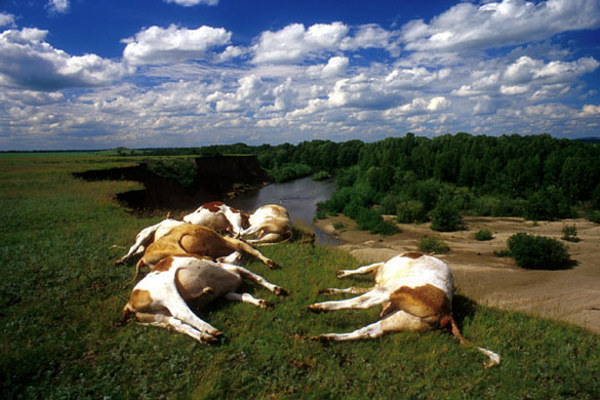|
Space Debris |
||||||||||
|
..
Written by Nancy Atkinson
People from the normally quiet and picturesque republic of Altai, Siberia keep their eyes on the sky when a launch occurs from the nearby Baikonur Cosmodrome, in Kazakhstan. This region is regularly littered with debris and toxic fuel from space launches, as Altai lies along the flight path of rocket launches to space. Unlike rockets launched from the Kennedy Space Center in Florida, which shed excess stages into the Atlantic Ocean, sections from rockets launched from Baikonur crash back on land, usually landing in the Altai region of the Kazakh steppe. Two incidents of falling debris in the past two weeks prompted farmers to file claims against the Russian space agency for damages. Four horses were reportedly killed from traces of toxic fuel in found in space debris that landed on grazing land and another 4.5 meter chunk of metal landed very close to a house. According to the Moscow Times, the Russian Federal Space Agency and Altai authorities have designated a strip of land where rocket debris is supposed to fall. People who live in the zone are given at least 24 hours' notice of falling debris. Only those outside the zone are entitled to any compensation for damage caused by the launches. The two recent incidents both occurred outside the zone, an official said.
In 2007, 27 people in the Ust-Kansky region were hospitalized
with cancer-related illnesses they said were linked to contamination from
falling debris. Also, in September 2007, a Proton-M rocket carrying a Japanese
communications satellite malfunctioned around two minutes after takeoff,
crashing near another Kazakh city, Zhezkazgan. No one was injured in the
incident, but Russia paid Kazakhstan more than $2 million in compensation,
after admitting that the rocket had been filled with higher-than-permissible
levels of toxic heptyl fuel.
In cases where there is a rocket malfunction, the procedure is for ground control to destroy it, often spreading debris outside the expected area. People from the region say that the Soviets thoroughly cleaned up debris from the discarded stages, but clean-up efforts have scaled back considerably since the Soviet Union fell. The pictures used here are from a 2002 photo essay by Norwegian photographer Jonas Bendiksen showing the large pieces of debris laying lying around the Altai region. Original News Source: New York Times SOURCE: Universe Today |
||||||||||
Related
Links:
|
||||||||||
|
..
KAZAKHSTAN'S SPACESHIP JUNKYARD
On April 16, Russia announced that it would henceforth launch military satellites at the Pletsnesk cosmodrome in northern Russia, ending the practice of launching satellites from the Baikonur Cosmodrome in Kazakhstan. This shift will deprive Kazakh children of the chance to watch some satellites take off, though Baikonur will remain the launchpad for commercial "birds" and manned missions. As these photos show, it will also spare Kazakhs the fallout, literal and otherwise, that occurs in a launch's wake.
All space-bound rockets consist largely of fuel tanks and booster stages that fall back to earth when spent, never reaching orbit. In landlocked Baikonur, Russia's primary launching complex in Kazakhstan, these spaceships crash to earth. This photo essay visits the areas where the supporting rockets land, and shows the people living under the flight paths who contend with flaming spaceship wrecks several times each month. Apart from the fear of having a spaceship crash through their roofs, residents in the area complain of the ill effects of leftover toxic rocket fuel. With the relocation of Russian military launches, more than half of which currently take off from Baikonur, these people may get some relief. However, one group of people is probably sorry to see Baikonur lose business; the region's scrap metal dealers are getting rich trading metal from the rockets' titanium alloy hulls. SOURCE: Eurasia.net |
||||||||||
|
..
Image credit: ROSCOSMOS PAO Kazakhstan's Spaceship Scrap Collectors In Russia, Soyuz, Proton, only the boosters and the first stage are generally recovered by local scrap dealers. Scrap Metal Dealers Live Off
Falling Rockets
Image credit: Jonas Bendiksen/Eurasianet.org ..
Image credit: ROSCOSMOS PAO ..
Image credit: Jonas Bendiksen/Eurasianet.org ..
cattle and sheep regularly die because rocket fuel poisons the soil. Image credit: Jonas Bendiksen/Eurasianet.org ..
..
..
..
..
|
||||||||||
| FAIR USE NOTICE: This page contains copyrighted material the use of which has not been specifically authorized by the copyright owner. Pegasus Research Consortium distributes this material without profit to those who have expressed a prior interest in receiving the included information for research and educational purposes. We believe this constitutes a fair use of any such copyrighted material as provided for in 17 U.S.C § 107. If you wish to use copyrighted material from this site for purposes of your own that go beyond fair use, you must obtain permission from the copyright owner. | ||||||||||
|
|














